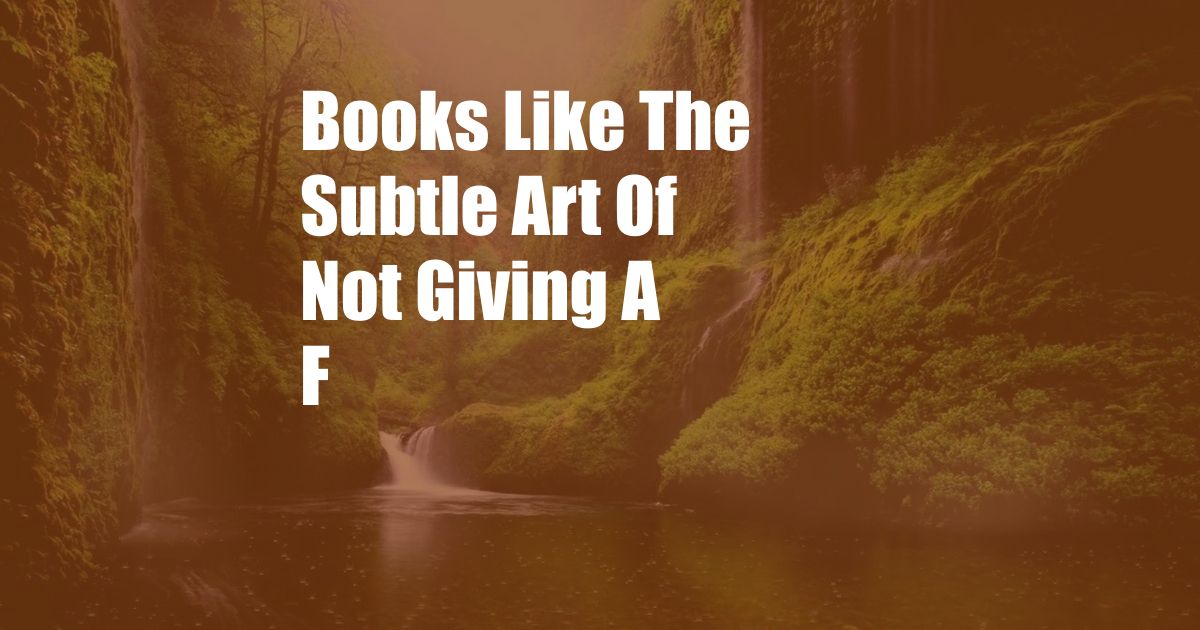
Discover Books That Will Transform Your Perspective: Explore the Subtle Art of Not Giving a F* and Beyond
In the realm of self-help literature, Mark Manson’s “The Subtle Art of Not Giving a F*” has emerged as a revolutionary force. Its bold and unapologetic approach to personal growth has resonated with millions, inspiring us to embrace vulnerability, self-acceptance, and the pursuit of meaningful purpose.
While Manson’s insights have sparked a transformative shift in our mindset, there is a wealth of other literary works that offer profound wisdom and guidance on the journey of personal growth. If you’re seeking more books that will challenge your assumptions and empower you to live a more fulfilling life, look no further.
The Power of Vulnerability: “Daring Greatly” by Brené Brown
In her groundbreaking book “Daring Greatly,” Brené Brown delves into the transformative power of vulnerability. Through her extensive research and personal experiences, Brown reveals that embracing vulnerability is not a sign of weakness but rather a catalyst for courage, connection, and authenticity.
Brown’s insights provide practical tools and strategies for overcoming the fear of shame and vulnerability. She encourages us to recognize that vulnerability is an integral part of our humanity and that it is through embracing our imperfections that we unlock our true potential.
Mindfulness and Acceptance: “The Happiness Trap” by Russ Harris
Russ Harris’s “The Happiness Trap” offers a refreshing perspective on the pursuit of happiness. Through the lens of Acceptance and Commitment Therapy (ACT), Harris challenges the notion that happiness is the ultimate goal.
Harris argues that the pursuit of happiness can paradoxically lead to suffering and dissatisfaction. Instead, he advocates for cultivating mindfulness, acceptance, and values-based action. By learning to accept our experiences, both pleasant and unpleasant, and focusing on what truly matters, we can find lasting fulfillment and well-being.
Embracing Discomfort: “The Art of Learning” by Josh Waitzkin
Josh Waitzkin, a world champion chess player and martial artist, shares his insights on the importance of embracing discomfort in his book “The Art of Learning.” Waitzkin argues that true growth and mastery come through pushing ourselves beyond our comfort zones.
Waitzkin provides practical strategies for developing a growth mindset, cultivating resilience, and overcoming the fear of failure. He emphasizes that discomfort is not something to be avoided but rather an opportunity for learning and transformation.
The Importance of Play: “The Power of Play” by Stuart Brown
In “The Power of Play,” Stuart Brown explores the transformative power of play throughout the lifespan. Brown argues that play is not merely a frivolous activity but rather an essential ingredient for creativity, innovation, and well-being.
Brown’s research reveals that play fosters cognitive development, problem-solving skills, and emotional regulation. He encourages us to incorporate more play into our lives, both for personal enjoyment and for its profound benefits on our mental and physical health.
The Practice of Self-Compassion: “Self-Compassion” by Kristin Neff
Kristin Neff’s “Self-Compassion” offers a comprehensive guide to the practice of self-compassion. Neff argues that self-compassion is not about being self-indulgent but rather about treating ourselves with the same kindness and understanding that we extend to others.
Neff provides practical exercises and meditations to help cultivate self-compassion. She emphasizes that self-compassion is a skill that can be developed over time and that it is essential for our mental and emotional well-being.
FAQ on the Subtle Art of Not Giving a F* and Related Concepts
Q: What is the core message of “The Subtle Art of Not Giving a F*”?
A: The book challenges the idea that happiness is the ultimate goal and encourages readers to embrace vulnerability, accept their imperfections, and focus on what truly matters.
Q: What does it mean to practice mindfulness and acceptance?
A: Mindfulness involves paying attention to the present moment without judgment, while acceptance involves acknowledging and accepting our experiences, both pleasant and unpleasant.
Q: Why is it important to embrace discomfort?
A: Discomfort is an opportunity for growth and learning. By pushing ourselves beyond our comfort zones, we can develop resilience, overcome the fear of failure, and unlock our true potential.
Q: What role does play have in our lives?
A: Play fosters creativity, innovation, problem-solving skills, and emotional regulation. Incorporating more play into our lives can enhance our well-being and support our personal growth.
Q: How can I cultivate self-compassion?
A: Self-compassion involves treating ourselves with kindness and understanding. It can be cultivated through practices such as mindfulness, meditation, and self-reflective exercises.
Conclusion
The books discussed in this article offer a wealth of insights and guidance on the journey of personal growth. By embracing the principles of vulnerability, acceptance, mindfulness, play, and self-compassion, we can cultivate a more fulfilling and meaningful life.
Are you ready to embark on a transformative journey? Dive into these books and discover the power to let go of what doesn’t matter and live a life that is truly aligned with your values and purpose.